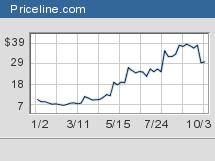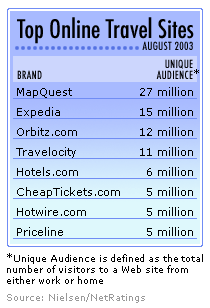NEW YORK (CNN/Money) -
First there was the dot.com bust. Then the nation was at war. Neither scenario, however, damaged the online travel industry's explosive growth and rapid consolidation.
But now industry watchers say the boomtime for the companies and their stocks may be over.
Lorraine Sileo, analyst with PhoCusWright, a Connecticut-based consultant to the e-travel industry, suspects the party is definitely winding down.

"This industry has had fantastic momentum so far," Sileo said. "The challenge now is the big up sell. Most people considered to be the key targets to switch over to the online medium have already done so. So how do you expand market share?"
Added Sileo, "While it's true that consolidation has been going on for a number of years, there's not much more opportunity left there because all the major sites have been gobbled up by a large entity."
Last month, for example, New York-based InterActiveCorp (IACI: Research, Estimates), owned by media mogul Barry Diller, agreed to buy online discount travel Web site Hotwire.com.
If regulators approve the deal, IAC will own three of the top six most-visited Internet travel reservation sites, including Expedia.com at No. 1, Hotels.com at No. 4, and Hotwire at No. 6.
Travelocity.com, the No. 2 online travel site, is owned by Southlake, Texas-based Sabre Inc (TSG: Research, Estimates).
Chicago-based discount fares provider Orbitz, the third-ranked site, is owned by the nation's five largest airline companies -- AMR Corp. (AMR: Research, Estimates), UAL Corp. (UAL: Research, Estimates), Delta Air Lines (DAL: Research, Estimates), Northwest Airlines (NWAC: Research, Estimates) and Continental Airlines.

Priceline.com (OCLN: Research, Estimates), the only other "available" pure-play company left in the arena, was the fifth most-visited site by travelers.
As far as further consolidation is concerned, analysts doubt InterActive Corp would go after Priceline because of regulatory issues. "Sure there are some smaller names, but they're unattractive to big corporations because their market share is probably 1 percent or less," said Ethan McAfee, analyst with hedge fund Capital Crossover Partners.
"This is a crowded and brutal market that makes the NHL look like the opera," said Henry Harteveldt, principal analyst with Forrester Research."It also lacks customer loyalty. Our research shows that only 4 in 10 consumers who use online travel sites say they routinely go to the same site."
In fact, Orbitz still is struggling to become profitable two years after its launch. Plans to go public last year were delayed because of a government probe into its alleged role in e-travel competition.
The company recently amended its IPO filing for the second time and indicated that it continued to lose money in the first six months of 2003, logging a net loss of $5.3 million, compared with a net loss of $16.5 million in the first half of 2002.
"Even though Orbitz has problems, it still has the seed money from the airlines to go alone," Harteveldt said. "Any other newcomer who wants to get in has to be backed by deep pockets. You need at least $100 million to launch the name, and as Orbitz shows, at least 3 to 4 years to gain traction."
Shrinking pie in the sky?
So far this year, consumers have spent $28 billion booking their travel plans -- including air travel, hotel and car reservations -- on the Internet. That's a 37 percent jump over last year, according to Forrester Research.
However, total industry sales next year are expected to grow at a slower pace, about 21 percent to $34 million.
"This is the first time we're seeing slower growth in online bookings for leisure travel," PhoCusWright's Sileo said.
At the same time, both Sileo and Harteveldt say that the next stage for the industry is evolution and grab for market share. One way to do that is by going after the ethnic market, Hispanics and Asian-Americans, with tailored packages or international expansion.
"Online travel in 2004 will represent only about 15 percent of the industry's total revenue for the year. So there's huge upside to grow," Harteveldt said. "The fierce competition now is about building the brand."
McAfee agrees. "Expedia and Hotels.com have the strongest brand appeal right now," he said. "Priceline is losing market share because customer satisfaction is by far the worst. Expedia has better technology and a stronger management team."
He also doesn't favor Priceline stock, citing a huge 205 percent gain in its shares this year, mostly on the back of a runup in Internet stocks .
With a price-to-earnings ratio of 58 times this year's earnings, the company's stock trades at a steep premium to its peer group's P/E of 28.8, according to Thomson Financial. Priceline's revenue last year fell 14 percent from the same period a year ago.
| Related Stories:
|

|
|
|
|
"It's a very expensive stock. That's why we've stayed away from it," McAfee said.
Matthew Harrigan, analyst with Janco Partners, has a "buy" rating on Diller's InterActiveCorp. "They've done a great job at cobbling together great brands through acquisitions. It's also a much cheaper stock compared to the other large-cap media names like Yahoo! and Amazon."
The stock is up 51 percent this year and trades at a P/E of 45, compared with Yahoo!'s lofty P/E of 112 times this year's estimate and Amazon's P/E of 93.
"InterActive hasn't become too large yet and I think it can still grow its business further," Harrigan said. "It's a large cap name with a mid-cap growth factor."

--Analysts quoted in the story do not own shares of the companies that they cover and their firms do not have an investment banking relationships with Priceline.com or InterActive Corp.
|

